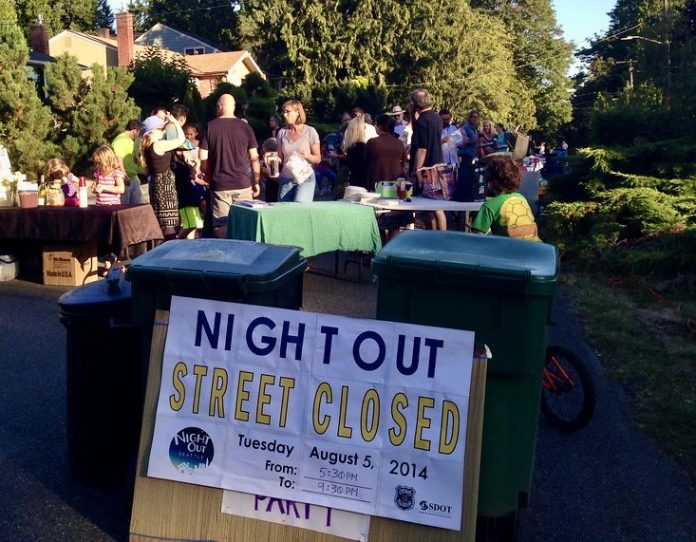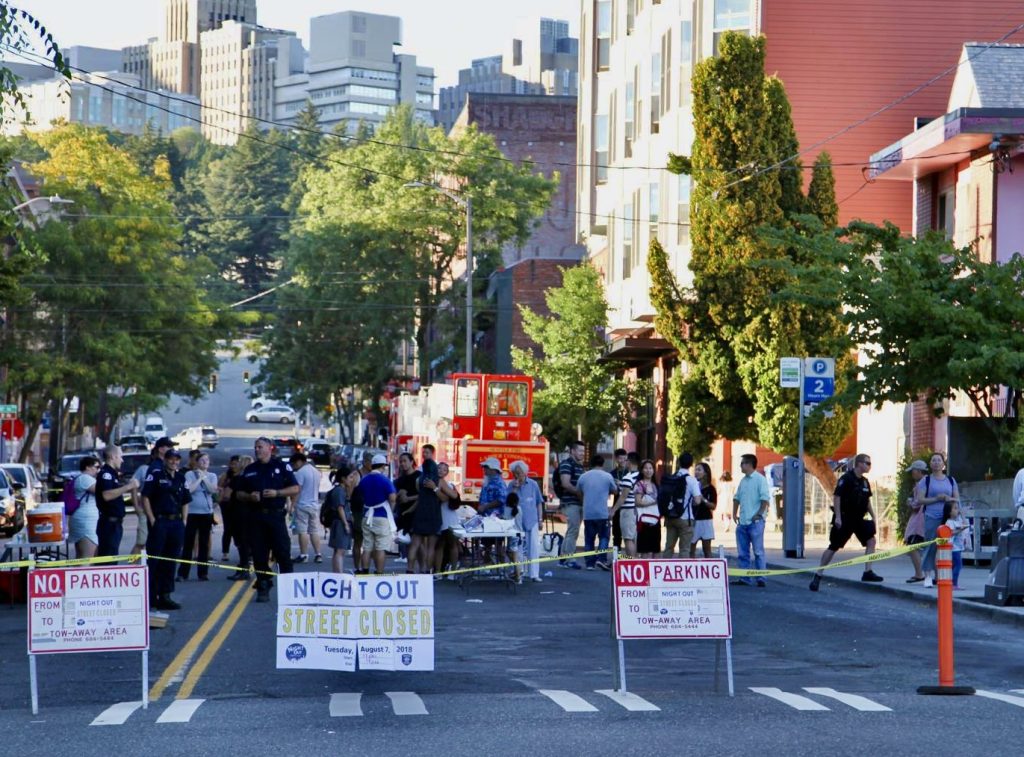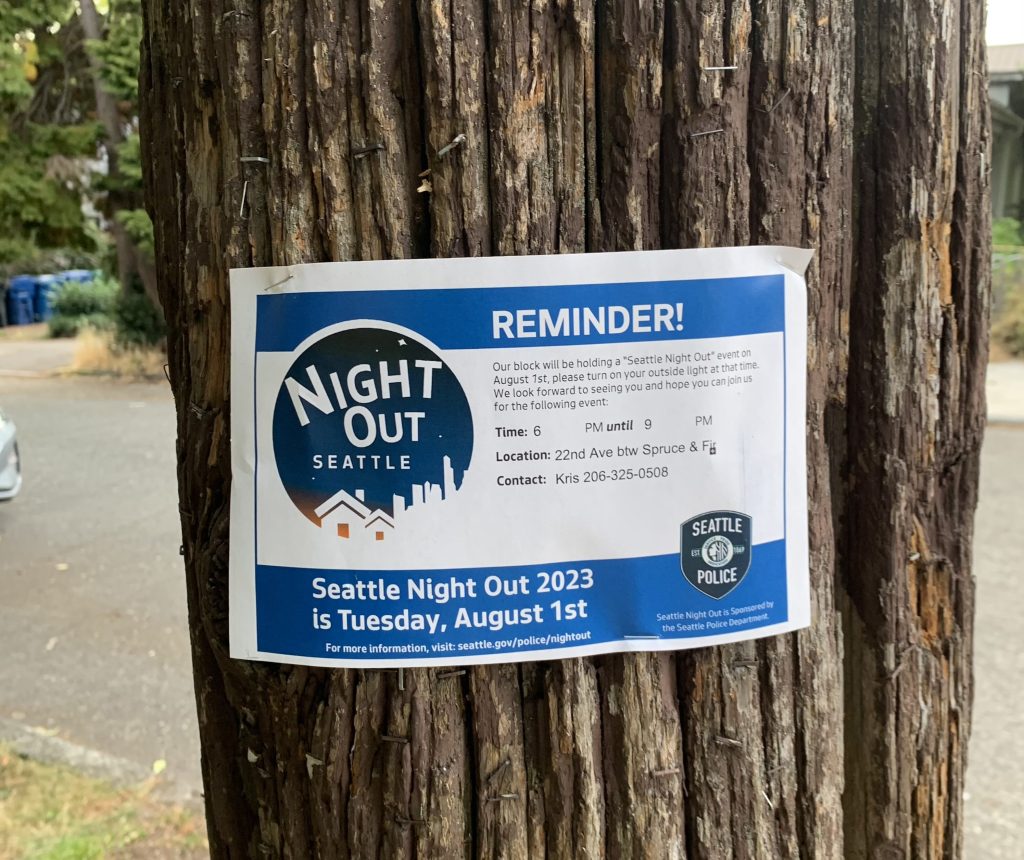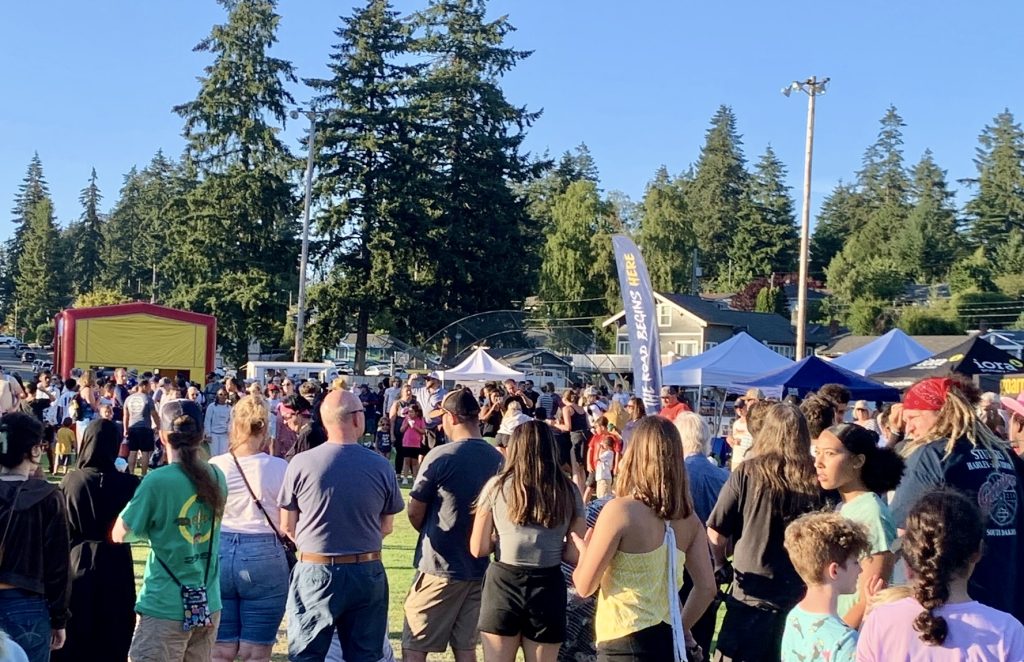
38 million people are expected to participate this year in cities nationwide.
This Tuesday people might notice something special going on where they live. As part of National Night Out, neighbors will be gathering for block parties in cities across the U.S. on August 1. According to the Seattle Police Department, which organizes Seattle Night Out, approximately 850 parties have been registered in Seattle alone — much of which will take place on non-arterial streets closed to vehicle traffic.
“The Seattle Police Department has participated in Night Out for many years! We encourage neighborhoods and Block Watches to host parties in their community, and we do our best to attend as many as we can,” said Detective Judinna Gulpan, Public Information Officer, in a written statement for The Urbanist.
While National Night Out presents a one-night portrait of what cities could be like if they opened more streets to people and increased social interaction, the event’s history has its roots in crime prevention efforts.
National Night Out was first conceived in the 1980s by Matt Peskin, a community watch volunteer in the Philadelphia suburbs who wanted to create an event that would foster social connections between neighbors and law enforcement as a means to increase communication and trust.
“This is not ‘Kiss a Cop Day’ or something like that. It’s a program that really makes a difference. It’s a lot of fun to put together, it reaches deep into neighborhood — and community-building, and it works,” said Peskin, founder of National Night Out and executive director of the National Association of Town Watch (NATW), which runs the program, in an article published by the U.S. Department of Justice.
The first National Night Out occurred in 1984, and according to NATW’s website, it included 2.5 million neighbors across 400 communities in 23 states. Since then National Night Out has continued to increase in participation: In 2023 an estimated 17,000 communities will hold National Night Out events nationwide with about 38 million people taking part. In Washington State, 167 cities have registered for the event, including nearly all Puget Sound cities.
Tacoma is another Puget Sound metro area with big plans for National Night Out. In Pierce County the event is organized by Safe Streets, a nonprofit organization. Connor Schultz, Community Mobilization Specialist with Safe Streets, estimates there are currently 60 registrations, but the actual number of block parties will be higher.
“I usually get a few last minute stragglers in the final couple of days,” Schultz said in an email. Additionally, while Safe Streets is contracted by the City of Tacoma to organize National Night Out, additional events may be organized directly with city departments and thus left out of Safe Streets’ accounting.
Like Seattle, Pierce County registrations for National Night Out events can include a request to open non-arterial streets to people so neighbors have additional space to socialize. Some communities lacking public spaces like parks have seized the opportunity.
“My work is usually in the unincorporated areas of the county, so when I go to NNO [National Night Out] events it’s almost always in those areas. The area of Parkland immediately south of Tacoma is a big focus for the county and the health department for a multitude of reasons, many of which stemming from the fact that it’s basically an urban area without an urban support structure. Last year’s National Night Out became larger than I, at least, expected and I don’t think anyone else expected it either,” Schultz said.
While fewer than 100 people were expected to attend, Schultz estimates that a couple hundred people ended up showing up.
“A large number of community organizations attended with plenty of activities to share from performances to nature walks. There was always something going on and everyone had an incredible time. This year’s looking to be even bigger, and I’m looking forward to seeing what happens,” he said.
With its roots in crime prevention, a major aspect of National Night Out in many cities is the engagement of law enforcement. In Bellevue, for example, the police department is hosting a party at Everett Park with food, bounce houses, and clowns. Attendees will also get a chance to look at some of the police equipment and vehicles and socialize with police officers.
In Seattle, however, the community engagement goes beyond law enforcement. “Registrants can select whether they would like various City agencies to attend their parties – for example – Seattle Police Department, Seattle Fire Department, Office of Emergency Management, and our city elected officials,” Guplan said.

Public outreach for National Night Out in Seattle, however, is conducted by the Seattle Police Department, with the Relational Policing Innovation Team and Crime Prevention Unit taking the lead for advertising the event in each precinct area.
This year SPD launched a new streamlined, all online registration process that includes a public facing Night Out map that registrants can opt into. The new registration process also provides automated email confirmations and an internal dashboard for registered parties. In an effort to get out the word to more communities, Night Out materials are now also available in many different languages.
In Tacoma, Safe Streets has been working to get National Night Out on more residents’ radar, and Schultz hopes that the effort will pay off.
“I joined Safe Streets in late 2019, just in time for Covid to shut everything down. I also started coordinating [National Night Out] in 2020 so the efforts we made to encourage neighborhood togetherness when it was a risk just being near each other was quite the challenge,” Schultz said. “Since then the major effort has been to encourage neighborhoods to come back together. It’s really the “big” effort that we do here at Safe Streets in general, but it’s also true for National Night Out.”

“I have probably half the number of registered events that there used to be and it’s stayed consistently at the level for the years I’ve been doing this. That said, every time a neighborhood comes together they never fail to have a fun time and everyone is really glad they participated,” he added.
Will you participate in a National Night Out event in your neighborhood in 2023? We want to know. Send your block party photos to share The Urbanist community to natalie [@] theurbanist.org.
Editor’s Note: An earlier version of this piece added a paragraph including editorialized commentary and additional materials by Publisher Doug Trumm that was not viewed by the author before publication. It has since been reverted to the author’s original draft.
Natalie Bicknell Argerious (she/her) is a reporter and podcast host at The Urbanist. She previously served as managing editor. A passionate urban explorer since childhood, she loves learning how to make cities more inclusive, vibrant, and environmentally resilient. You can often find her wandering around Seattle's Central District and Capitol Hill with her dogs and cat. Email her at natalie [at] theurbanist [dot] org.



